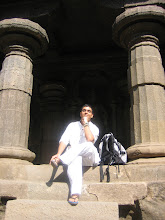
Some time ago, I met up with a number of Buddhist friends during a temple visit and we decided to go to lunch afterwards. We went to an Indian restaurant, we all sat down, and then we started talking about what to order. It sounded something like this:
"Hmm, I wonder how their roghan gosht is".
"Oh no, you HAVE to get the chicken vindaloo, its awesome!"
"I think I'm gonna go with the chicken tikka masala".
"I'm dying for some lamb curry, I haven't had it in ages. Rob, what are you gonna get?"
"Aloo gobi" I said, referring to the classic potato and cauliflower dish.
If you consider yourself a Buddhist, then there are two possible responses to this little episode. It may seem completely mundane and uneventful or it may strike you as inappropriately awkward, to say the least.
Vegetarianism, the "V-Bomb" if you will, always seems to be controversial for vegetarians and non-vegetarians alike and this is, interestingly enough, true within modern Buddhist practice too. Worldwide, the majority of Buddhists out there are not vegetarian. There are reasons for this, as will be discussed later. However, there's something particularly curious about this fact: most Buddhists in the West are not vegetarian either. There are explanations for this too but is this really what we would expect?
In Western civilization, vegetarianism has an ancient history, going back at least 2500 years to ancient Greece. Mathematician and philosopher Pythagoras (of a2 + b2 = c2 fame) was a proponent of vegetarianism and the long list of noteworthy and influential vegetarians includes Leonardi da Vinci, Thomas Edison, Seneca the Younger, Voltaire, and Samuel L. Jackson.
Generally speaking, in the West, those who are drawn to Buddhist teachings and especially those that actually practice tend to have a very socially liberal persuasion. The vegetarian movement within Western liberalism has been around for a long time so it would seem that when Buddhism, in its various forms, started to come West, vegetarianism would be the norm. The reality, as mentioned above, is the opposite.
It seems to be a taboo topic for a veg and non-veg Buddhist to discuss. I try hard not to bring it up (in a serious manner at least), with my Buddhist friends because it almost always gets awkward since I myself am a vegetarian. Some responses I've gotten from non-veg Buddhists include "oh well, you don't need to be a vegetarian to practice" or "uhh well um, yeah I'm working up to it...slowly". Simply put, meat eating among Buddhists in the West has become a most peculiar institution. To figure out how it became so and what, if anything can or should be done, we first need to go back the source: the Buddha himself.
In the Pali texts, generally regarded as the oldest extant sources of Buddhist teachings, we find a set of teachings called the Five Precepts. These Precepts are, in a way, the "kindergarten" of Buddhist practice, the bare minimum guidelines we should try our best to follow. What's precept number one? "I undertake the training rule to refrain from taking the life of any living creature". That's right, do not kill, anything. Many people, myself included, interpret a vegetarian diet to be the one of the logical, natural, and obvious implementations of this rule. Others however, don't stretch the First Precept that far because, as they correctly point out, the Buddha didn't.
According to the Pali sources, the Buddha himself was not a vegetarian and, although certaintly a good idea, did not mandate his students to be vegetarians either. Why would he do such a thing if he was on the earth for "benefit of gods and men"? One answer is that this was an expedient means. Back in ancient India, the practice was for monks and nuns to wander. Then, as now, the diversity of cultures, languages, and customs from region to region was enormous. The monks were supposed to accept ANY food offerings from the laity and as long as the meat wasn't killed specifically for them, it was OK. The life of a wandering ascetic is tough and its also possible to find oneself in a situation where it just wasn't possible to avoid taking meat. From this perspective, it all seems very practical, especially when the main concern is on the spirit of generosity from the giver and the spirit of humble gratitude from the receiver.

While the early texts have a more pragmatic view towards meat eating, the Mahayana tradition has a much more strong take on eating meat: DON'T DO IT. In many extremely popular and influential Mahayana texts like the Lankavatara, Shurangama, and Brahma Net Sutras, we find mild to extremely powerful condemnations of meat eating. The gist of these arguments is that eating meat extinguishes the seed of compassion of one following the Bodhisattva Path.
Historical and sociological explanations for why vegetarianism became so emphasized in early to middle Mahayana teachings in Buddhist India abound. We don't, however, need to delve into such academic discussions in order to understand this from a "Buddhist" point of view: being a vegetarian while not explicitly stated in the early texts, is a natural and immediate practice of compassion, one of the "signature" Mahayana emphases.
When Buddhism spread out to East Asia, China in particular, many of these same debates continued. David Loy points out in his recent book "Money, Sex, War, Karma (Wisdom Pubs, 2008)", that one of the reasons the Chinese Sangha went veg was because the laity expected it of the monastic community. To this day, the Chinese Buddhist traditions are one of the few all vegetarian traditions out there.
Nick Kristof, popular writer for the New York Times wrote of his experiences growing up on a farm and how this endeared him to the welfare of animals. Indeed, his piece entitled, "A Farm Boy Reflects" is an argument in favor of an expanded animal rights law on the Californian ballot in November. In this piece, Kristof talks about his horror and sorrow at witnessing animals being slaughtered. The kicker, as he readily admits, is that is not a vegetarian. It seems like another instance of 1+1 = 143123.984.
Meditations on loving-kindness, metta, are very popular, especially in the West. But those who willingly choose to eat meat must recognize the contradiction that repeating phrases like "may all beings be well, happy, and free from suffering", and then dining on a T-bone steak represent.
The most common rationalization for meat eating is "well I didn't kill the meat, so I'm karmically clean". Perhaps, but the butchers and those involved in the meat industry are certainly not karmically clean. The abomination of modern factory farming is well established. If you eat a dead animal, its almost certain that your meal was not treated well, did not live a happy life, and had to endure a hell of a lot of suffering.
Sure, you may not have held the cleaver yourself but if no one ate meat, what use would we have for butchers in the first place?








No comments:
Post a Comment